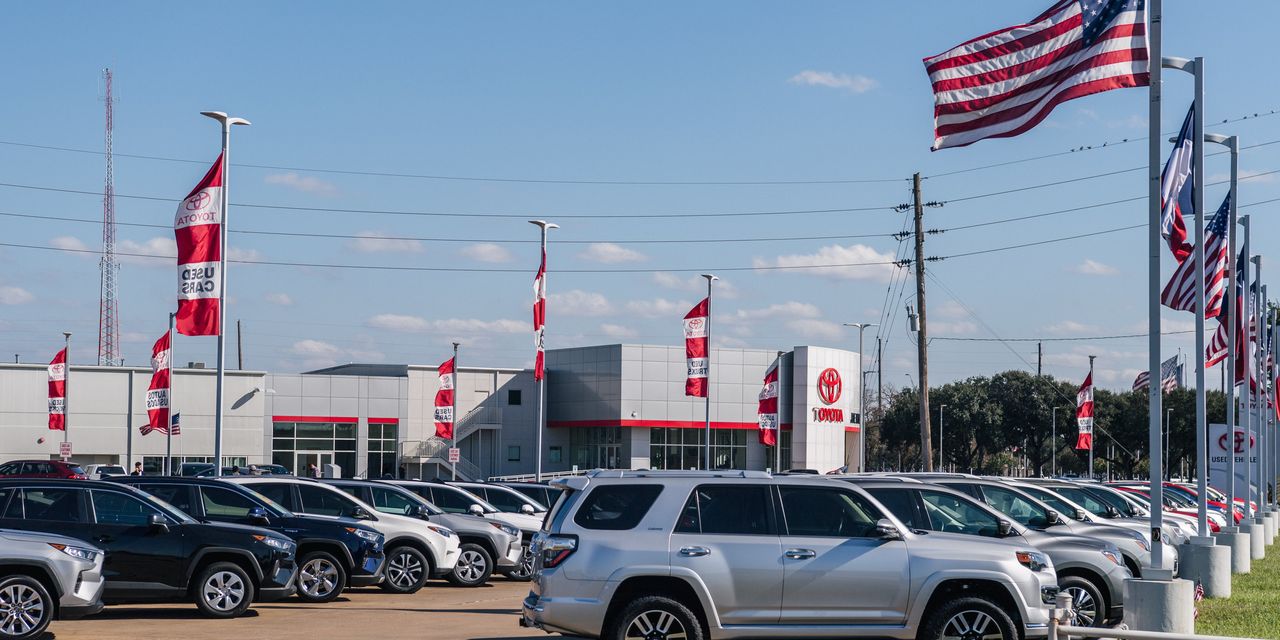

Big banks are pushing deeper into auto lending.
Bank of America Corp.
said last year was a record for auto-loan originations.
& Co. posted three straight quarters of records and said the fourth quarter was up 77% from a year earlier.
Ally Financial Inc.
said 2021 was its biggest year for auto lending since 2004.
Auto lending is a bread-and-butter business for many consumer banks. But their financial results for 2021, released earlier this month, showed it was a particularly bright spot when consumers and businesses were otherwise flush with cash and slow to take out loans.
U.S. banks increased their auto-loan balances by 12% over the course of 2021, according to a Moody’s Investors Service analysis of a handful of the largest. The banks increased total loans on their books marginally last year.
Generous government stimulus packages and a hot job market have helped put many consumers on stable financial footing and limited their demand for bank loans.
The restraint was overpowered by another pandemic trend in the auto market. Supply-chain bottlenecks curtailed production of new vehicles and pushed used-car prices to records. With cars in short supply and demand rebounding, particularly for more-expensive sport-utility vehicles, consumers paid more—and took on bigger loans.
“When somebody asks me how many cars we sold last month, I tell them, ‘All of them,’ ” said Brian Benstock, general manager at Paragon Honda & Acura in Queens, N.Y. “That’s been consistent now for the past seven, eight months.”
The average new-car loan in the third quarter was $37,280, up 8.5% from a year earlier, and the average used-car loan was $25,909, up some 20%, according to the credit-reporting firm Experian PLC.
The total dollar amount of auto-loan originations was on pace for a record in the first nine months of 2021, according to the latest data from the Federal Reserve Bank of New York. Lenders’ financial results suggest the market remained hot in the final three months of last year.
For lenders, the economics of making a loan right now work in their favor, partly because of rising used-car values. While delinquencies have been low, lenders that needed to repossess cars were able to sell them in the used-car market at historically high prices. In some cases, they have been able to recoup more money than they lent in the first place. (In a normal market, lenders tend to lose money when they sell repossessed cars.)
Banks also tend to serve customers with higher credit scores. “The credit universe has become more prime,” said Melinda Zabritski, senior director of automotive financial solutions at Experian.
How do you think big banks will fare in 2022? Join the conversation below.
Still, the current sweet spot for auto lending might last only until supply constraints ease and more vehicles hit the market.
“We do anticipate that used-car prices will decline,” said Warren Kornfeld, an analyst at Moody’s. “They are unsustainable.”
Falling prices could pose a risk for lenders that extended large loans on cars at higher values, and the consumers who took them. In that scenario, car owners might be more likely to default if they run into financial trouble, according to Mr. Kornfeld. And if lenders repossess those cars, they stand to recoup less from selling them into a falling market.
For the moment, market dynamics are good for banks. They provided 29% of new-car financing and 34% of used-car financing in the third quarter of last year, up from 25% and 31%, respectively, a year earlier, according to Experian.
That pulled market share away from the auto makers’ financing units, analysts said. Those so-called captive financing arms tend to offer cheap loans when they are trying to drum up vehicle sales. But with demand overpowering supply, the captives retreated.
“It opened up an opportunity to come in and compete for a larger share of that market,” said Tim Owens, consumer vehicle lending executive at Bank of America.
Write to Ben Eisen at ben.eisen@wsj.com
Copyright ©2022 Dow Jones & Company, Inc. All Rights Reserved. 87990cbe856818d5eddac44c7b1cdeb8
24World Media does not take any responsibility of the information you see on this page. The content this page contains is from independent third-party content provider. If you have any concerns regarding the content, please free to write us here: contact@24worldmedia.com

Common Mistakes When Using Athletic Field Tarps

High-Performance Diesel Truck Upgrades You Should Consider

Warehouse Optimization Tips To Improve Performance

Fire Hazards in Daily Life: The Most Common Ignition Sources

Yellowstone’s Wolves: A Debate Over Their Role in the Park’s Ecosystem

Earth Day 2024: A Look at 3 Places Adapting Quickly to Fight Climate Change

Millions of Girls in Africa Will Miss HPV Shots After Merck Production Problem

This Lava Tube in Saudi Arabia Has Been a Human Refuge for 7,000 Years

Four Wild Ways to Save the Koala (That Just Might Work)

National Academy Asks Court to Strip Sackler Name From Endowment

Ways Industrial Copper Helps Energy Production

The Ins and Out of Industrial Conveyor Belts